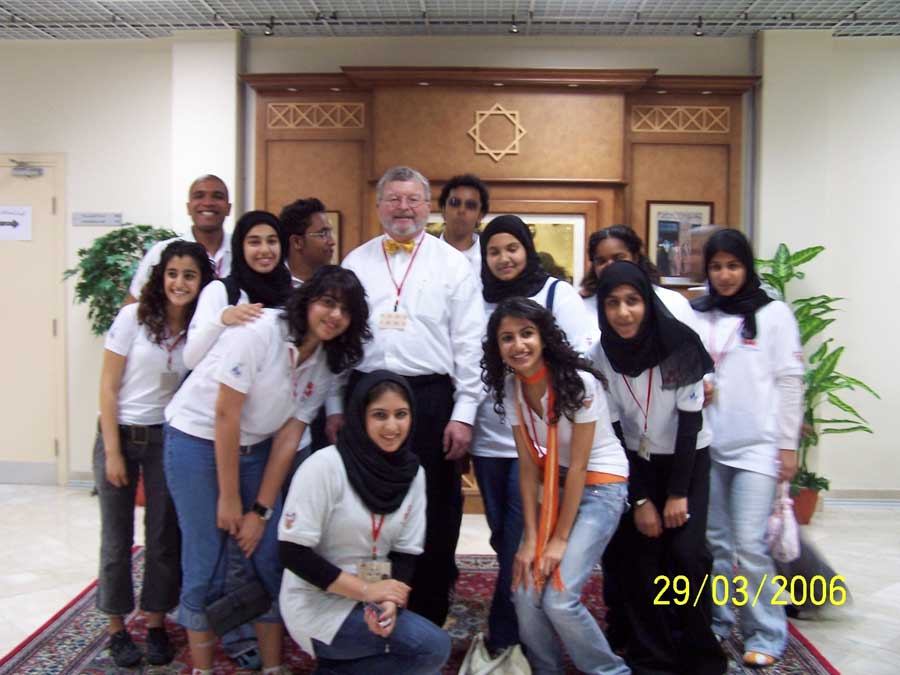High school students in Bahrain embrace volunteerism at three-day workshop

Volunteerism took center stage at a recent Volunteers for Change workshop in Bahrain where more than 65 students from the Global Learning and Observations to Benefit the Environment (GLOBE) program and their teachers gathered to learn more about voluntary work, developing community service projects, and organizing volunteers.
Russ Cargo, co-director of the Institute for Governance and Accountabilities, School of Public and International Affairs in the College of Architecture and Urban Studies at Virginia Tech, National Capital Region, served as a trainer during the three-day event and also gave the keynote address.
This was the first time in the Kingdom of Bahrain that a group of youths and representatives of organizations with a vested interest in volunteerism met to discuss what could be done locally to help promote volunteerism. The workshop was sponsored by the Ministry of Education in Bahrain, in cooperation with the Public Affairs Office in the U.S. Embassy and the Shaikh Khalifa Institute of Technology in Muharraq, Bahrain. Virginia Tech was the only American university represented.
In his keynote, Cargo emphasized the contribution of volunteers to civil society and how Non-Governmental Organizations (NGOs) are critical to their achieving success. “Volunteers are the backbone of civil society. Without voluntary action for the public good, communities would be greatly impoverished,” Cargo said. “However, so much more is possible through organized activity. Non-Governmental Organizations (NGOs) provide volunteers the opportunity for coordinated effort necessary to make a difference in areas with complex challenges such as health care, human services, human rights, environmental clean up, education, and the arts.”
During the workshop sessions, Cargo and Sawsan Abu fakherddine, a trainer from Lebanon, coached the conferees on how to maximize their effectiveness through work in NGOs. Cargo presented sessions on NGO structures, volunteer management, program evaluation and reporting, fundraising, and NGO governance. The students began work on designing organizations to address problems they recognized in their communities. Among the projects proposed by the students were a youth center built around a basketball facility, a counseling program of overweight children, and an organization to help the elderly adjust to the dramatic economic and social changes that have occurred in the Persian Gulf.
Students at the conference had an opportunity to meet local NGO leaders who presented briefings on their organizations’ programs to serve the elderly, orphans, and disabled, and to better the environment. During the workshops, examples from the work of local organizations were used to bridge theory and practice.
“I was very impressed by both the knowledge and the maturity demonstrated by the high school students who attended these workshops,” Cargo said. “I forgot they were high school students and began to regard them as remarkably capable university students. They left an exceptionally positive impression – a real antidote to what we see on the news.”
The Institute for Governance and Accountabilities in the School of Public and International Affairs at Virginia Tech is engaged in US and in international technical assistance work that examines the relationships among nonprofit organizations, governments, and the business sector. The Volunteers for Change program in Bahrain was an opportunity to both promote volunteerism among high school students in the Middle East and provide an opportunity to examine the relationships between the government of the Kingdom of Bahrain, local NGOs, and the Bahraini schools.
The GLOBE program was launched by Vice President Al Gore on Earth Day, April 22, 1994. A worldwide hands-on primary and secondary school-based education and science program, it seeks to teach young students experimental skills using real experiments and equipment and collaboration with students in a global network of more than a hundred other participating nations.


